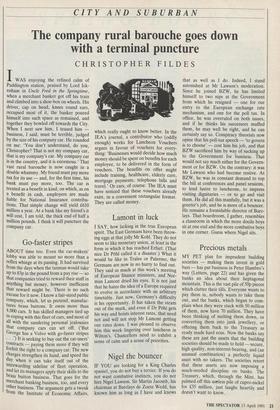Go-faster stripes
ABOUT time too. Even the car-makers' lobby was able to mount no more than a reflex whinge at its passing. It had survived from the days when the taxman would take' up to 83p in the pound from a pay rise — so that companies tried to reward their staff in anything but money, however inefficient that reward might be. There is no such excuse for it now. I know a fair-sized public company, which, let us pretend, manufac- tures brass buttons. It owns more than 4,000 cars. It has skilled managers tied up ► n coping with this fleet of cars, and most of all with the sundering personal jealousies that company cars can set off. (`But George has a Volvo with go-faster stripes • • .) It is seeking to buy out the car-users' contracts — paying them more if they will forfeit the right to a company car. The new charges strengthen its hand, and speed the day when it can take itself out of the unrewarding sideline of fleet operation, and let its managers apply their skills to the brass button business. That goes for the merchant banking business, too, and every other business. The argument gets a tweak from the Institute of Economic Affairs, which really ought to know better. In the IEA's journal, a contributor who (oddly enough) works for Luncheon Vouchers argues in favour of vouchers for every- thing: 'Businesses would decide how much money should be spent on benefits for each employee, to be delivered in the form of vouchers. The benefits on offer might include training, healthcare, elderly care, mortgage payments, telephone bills and travel.' Or cars, of course. The IEA must have noticed that these vouchers already exist, in a convenient rectangular format. They are called money.


























































 Previous page
Previous page